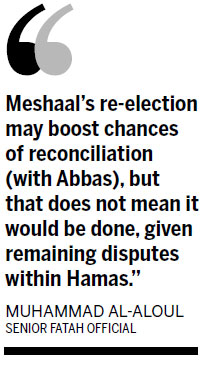Meshaal keeps position as Hamas leader
|
A Palestinian woman walks past mugs featuring Hamas leader Khaled Meshaal and Hamas Prime Minister Ismail Haniya (bottom right) at a souvenir shop in Gaza City on Tuesday. Meshaal, who was elected for a new term as head of the Palestinian Islamist movement, is well-respected in the Arab world and seen as the best choice to steer the Islamists through a Middle East in turmoil. Mohammed Abed / Agence France-Presse |

The Islamist Palestinian Hamas group re-elected Khaled Meshaal as its leader on Tuesday, despite past criticism of him by hardliners in the Gaza Strip, which the group rules.
A diplomat in the region said Egypt and Qatar had lobbied strongly on behalf of a reluctant Meshaal before the vote in Cairo by about 60 Hamas leaders who had met through the night.
Born in the Israeli-occupied West Bank, Meshaal, 56, has lived in exile for decades and, like his Hamas comrades, rejects Israel's right to exist. But he played a vital role in indirect, Egyptian-mediated talks between Israel and Hamas to secure a truce that ended an eight-day Gaza war four months ago.
Meshaal drew criticism last year from Hamas' Gaza-based leadership over what some officials saw as a personal initiative to heal a rift with Western-backed Palestinian President Mahmoud Abbas, whose rival Fatah party lost control of the Israeli-blockaded enclave in a brief civil war in 2007.
In a terse statement, a Hamas official said only that Meshaal had been re-elected at the Cairo meeting.
The diplomat in the region, who asked not to be identified, said Egypt's Islamist leadership and the wealthy Gulf emirate of Qatar had backed Meshaal, who had earlier promised to step down.
"They saw Meshaal as a moderate and an example of a leader who saw the world more comprehensively than other (Gaza-based) hardliners in the group," said the diplomat.
Meshaal left Damascus, where Hamas had a headquarters, about a year ago after the Sunni militant movement broke with President Bashar al-Assad over Syria's civil conflict.
In December, Meshaal traveled from Egypt to make his first visit to Gaza, where he told a rally he would never recognize Israel and pledged to "free the land of Palestine inch by inch".
Pariah treatment
Once treated as a pariah by many US-allied Arab leaders, Hamas has seen its standing in the region rise on the back of regional uprisings that have ushered in more sympathetic Islamist governments in Egypt and elsewhere.
Israel, the United States and most Western governments view Hamas as a terrorist group for its refusal to recognize Israel or to renounce violence that included suicide bombings in a Palestinian uprising a decade ago.
"I do not say Europe is going to open up to Hamas tomorrow," said the diplomat, but added that a "real engagement with the West" was possible if Meshaal persuaded Islamist colleagues to change their policies.
There was no official reaction from Israel to his re-election, although public radio described Meshaal as a "pragmatist with charisma", saying he represented "hardcore Hamas with a Western facade".
Palestinian political analyst Hani al-Masri said Meshaal's re-election signaled that Hamas is showing a desire for more moderation in order to build bridges with the West, but "it did not mean that Meshaal was a man who raises a white flag".
Meshaal burnished his credentials within Hamas after surviving an Israeli assassination attempt in Jordan in 1997 and succeeded the group's founder, Sheikh Ahmed Yassin, in 2004 after Israel assassinated the cleric who used a wheelchair.
Meshaal, who divides his time between Cairo and Qatar, has tried to overcome his differences with Abbas, who supports a two-state solution to the Israeli-Palestinian conflict.
"Meshaal's re-election may boost chances of reconciliation (with Abbas), but that does not mean it would be done, given remaining disputes within Hamas," said Muhammad al-Aloul , Senior Fatah official.
Reuters - AFP
(China Daily 04/03/2013 page11)









